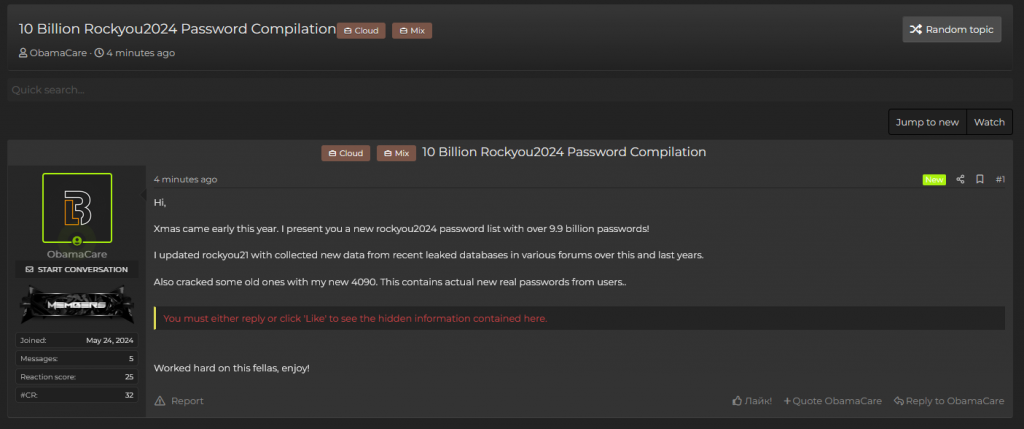In a significant cybersecurity breach, nearly ten billion unique passwords were leaked on a popular hacking forum. The Cybernews research team warns that this leak could pose severe dangers, especially for users who reuse passwords across multiple accounts.
Unveiling the Massive Leak
On July 4th, a forum user named ObamaCare posted a file titled rockyou2024.txt, containing an unprecedented 9,948,575,739 unique plaintext passwords. This user, active since May 2024, has previously leaked sensitive data from various sources, including a law firm, an online casino, and a college.
Cybernews researchers cross-referenced these passwords with their Leaked Password Checker and found that the RockYou2024 leak combines data from both old and new breaches. This makes the leak particularly dangerous, as it exposes real-world passwords used by individuals worldwide, increasing the risk of credential stuffing attacks.
 Source: Cybernews
Source: Cybernews
The Threat of Credential Stuffing Attacks
Credential stuffing attacks involve using stolen passwords to gain unauthorized access to multiple accounts. This method can be devastating for both users and businesses. Recent attacks on companies like Santander, Ticketmaster, and Advance Auto Parts were the result of credential stuffing against their cloud service provider, Snowflake.
With the RockYou2024 password compilation, threat actors have a powerful tool for conducting brute-force attacks, potentially compromising various online accounts and systems.
A Growing Threat
This is not the first massive password compilation leak. Three years ago, Cybernews reported on the RockYou2021 leak, which included 8.4 billion plaintext passwords. Since then, the dataset has grown by 1.5 billion passwords, reaching nearly ten billion. The RockYou2024 compilation likely includes data from over 4,000 databases collected over more than two decades.
Cybernews researchers believe this extensive dataset can target any system vulnerable to brute-force attacks, from online services to industrial hardware.
Potential Consequences
The RockYou2024 compilation, combined with other leaked databases containing email addresses and credentials, could lead to widespread data breaches, financial fraud, and identity theft. The potential for a cascade of cyberattacks is significant, as threat actors exploit this vast trove of data.
Protecting Yourself from the RockYou2024 Leak
While there’s no foolproof way to protect against such a massive leak, there are steps individuals and organizations can take to mitigate the risks:
- Reset Affected Passwords: Immediately change passwords for all accounts associated with the leaked data. Use strong, unique passwords for each account.
- Enable Multi-Factor Authentication (MFA): MFA adds an extra layer of security by requiring additional verification beyond just a password.
- Use a Password Manager: Password managers can securely generate and store complex passwords, reducing the risk of password reuse.
- Leverage Netsweeper’s Security Solutions: Netsweeper provides advanced content filtering and threat detection tools that can help organizations identify and block access to malicious websites and phishing attempts. By implementing Netsweeper’s solutions, businesses can enhance their cybersecurity posture and protect against the exploitation of compromised passwords.
Cybernews will update their Leaked Password Checker with data from RockYou2024, allowing users to check if their credentials have been exposed.
The RockYou2024 leak marks another record-breaking breach in 2024, following the Mother of All Breaches (MOAB), which exposed 12 terabytes of data spanning 26 billion records. As cyber threats evolve, staying vigilant and adopting robust security practices is crucial in protecting personal and organizational data. In response to these growing threats, Netsweeper collaborates closely with the Global Anti-Scam Alliance and ScamAdviser to combat scams and fraud. By leveraging sophisticated algorithms, Netsweeper blocks access to fraudulent websites and phishing pages in real-time, using advanced data and intelligence to stay ahead of deceptive activities. This collaboration significantly enhances our capabilities in creating a safer online environment for users worldwide.
